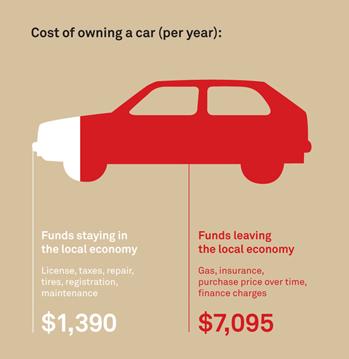Last updated on 2011.02.28
I've been slacking off on my bicycling lately---still on honeymoon with my new Beetle. But as spring and four-dollar gasoline (small price to pay for toppling Mideast dictators and throwing al-Qaida in the dustbin of history) approach, I plan to do a lot more two-wheeling. Now if I could just get everyone else to join me, we might save the economy.
...or so goes the thesis of a new Grist series on biking and the economy. The first article cites all sorts of economic benefits that may accrue from making more room for bicycles on the streets and in our daily lives. Much of the discussion is city-centric---it's a lot easier to reach the critical pedaling mass necessary to support a bicycle economy in Minneapolis or Sioux Falls than in Madison and Rutland.
But bikes do open up a new sector of the economy. In Portland (where my friend Greg Belisle is running for school board!), bicycling generates $90 million and 1150 jobs in the local economy. According to Grist's Elly Blue, all those bicycles support a growing food cart industry, as folks can make a buck or two selling cheap lunch to cyclists without investing in a big parking lot or even seats (cyclists bring their own!).
Getting more people out of their cars and onto bikes may also keep more money in the local economy. Consider that a lot of the money you spend on your car leaves town:

Infographic: Mgmt Design, courtesy of the National Building Museum
Gasoline, for instance, gives your local convenience store owner very little profit. Roger at the One-Stop probably makes more if you come in and buy a couple sandwiches than if you top off your gas tank. Besides, when you rely more on your bike and less on your car, you keep more money in your pocket to spend on other local goods and services.
Now there is one flaw in the economic thinking of Blue's article. Suppose we all hopped on our bikes and spent less on automotive expenses. We wouldn't necessarily spend an equivalent amount on bike parts and winky-blinky lights. If we drive our cars less, the roads need less maintenance, and the city ends up spending less on asphalt. A bike economy could actually result in less overall Gross Domestic Product. If you're a typical economist, that's a horrifying prospect: we have to grow grow grow!
But if you're me, you know that GDP is not the best indicator of economic health. Ring ring! Bicycle comin'!

In theory, the GDP could remain the same if people switched their spending so that less went to their cars, and more went to other things. A century ago, people spent proportionally more money on items that were of higher quality, lasted longer, and involved more labor to make -- furniture, houses, etc. Now we buy cheap plastic crap that breaks from China so we can still have more "stuff," even though it doesn't last as long, because we have more expenses for things like automobiles than they did a hundred years ago.
Who knows if it will ever happen, but just imagine if we paid people more to make quality goods locally, here in the USA? GDP would remain constant; it would just be reallocated from where it is now.
The biggest benefit by far would be a more fit population. Physical fitness is positively correlated with decreased health care costs, increased productivity, and increased gross personal income.
Keeping money in the local population would just be a small side benefit.
Mg, it is more than theory and once again, the author shows his ignorance of economics.
Whether by horse, bike, car or train, they are all transportation and their cost goes into the GDP. If bike saves money and does the job as efficiently, it increases productivity which actually enhances the GDP over the long-term because it leaves resources for additional consumption or saving/investment.
But, if the mode of transportation makes economic activity less efficient beyond the tangible (savings to personal or road construction/repair budget and community goods like the environment) and intangible (better health which might even be tangible via lower health care costs) benefits, it will decrease the GDP.
My point is what was said is nonsense. More importantly, it shows the author is incapable of linking two very related stances he holds.
1) On hand, he says ride a bike to help the local econonomy.
2) And, he then uses as justification of how much of car travel leaves the local economy. Unfortunately, the author also advocated a government bail-out of the industry for which most of the non-local expenditures go for (owning a car).
If the auto industry's economic importance is worthy of a $50+ billion investment by local Madison taxpayers, the guy can't then say it would be better if we didn't own cars. Unless of course, he somehow thinks paying a buy to dig a hole and fill it up ad infinitum is good for the GDP. Which in this case, doesn't surprise me either.
$50 billion would have bought a lot of bicycles and paved a lot of trails. Too bad our economy is so addicted to oil and automobiles that our leaders couldn't have considered alternative investments to the GM bailout.
Yeah, Cory. A lower BMI makes no sense to those that are up to their areolae in hock to industrial agriculture.
So Kristie Noem has voted twice now to support big oil subsidies and has wavered on ethanol...go figure. You don't suppose that there is a blogger out there that will call her on this obvious contradiction to her constituents do you?